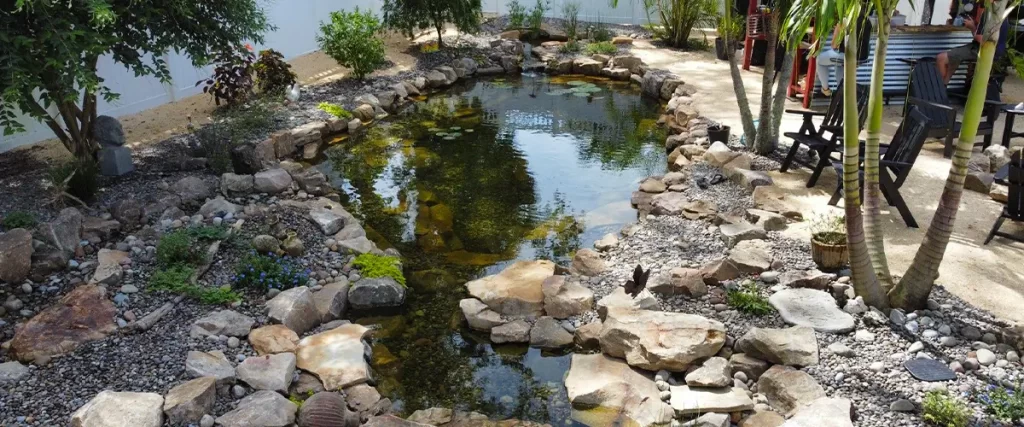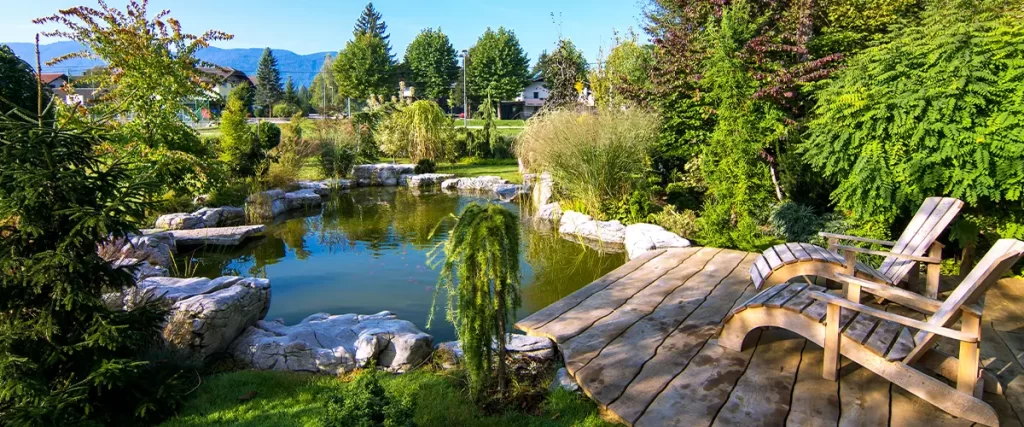If you live in Sanford or Deltona, you already know that hurricane season isn’t just about shuttering windows and stocking up on supplies. It’s about preparing every part of your home, especially the parts outside that don’t often make it onto emergency checklists. And if you’ve got a backyard pond, this one’s for you.
A pond isn’t just another landscaping feature. It’s a thriving ecosystem, a sanctuary for your fish, plants, and even local wildlife. But during hurricane season, it can quickly turn from a peaceful oasis into a mess of debris, contaminated water, and washed-out fish.
That’s why hurricane-proofing your pond isn’t optional; it’s essential. This guide will walk you through how to prepare your pond before the first storm hits and help you understand why doing so can save you a whole lot of time, money, and heartache later.
Why Backyard Ponds in Sanford and Deltona Need Storm Protection
Hurricane season in Central Florida brings strong winds, intense rainfall, and unpredictable flooding. Sanford and Deltona are in a part of the state that often sees the outer bands or even the direct impact of tropical systems. And while you might be used to prepping your home, your pond faces unique risks that require a different kind of attention.
The local soil in both areas tends to be sandy and doesn’t absorb water efficiently. That means heavy rain has nowhere to go, often leading to sudden flooding that can overflow your pond.
And it’s not just water you need to worry about, stormwater carries all kinds of contaminants like lawn chemicals, oils from the street, and even bacteria that can severely disrupt your pond’s water quality. If your pond is home to koi or goldfish, that kind of pollution can be lethal.
Another issue that gets overlooked is erosion. A pond’s edges can collapse if the ground around them gets oversaturated or if water flows too quickly across the landscape. After a storm, you might find that your once-groomed pond now looks like a muddy pit.
And don’t forget the wind. When winds reach hurricane strength, branches, leaves, and even objects from your yard can end up in the water, clogging up pumps and filtration systems or physically harming your fish.
So yes, your pond needs protection. And living in Sanford or Deltona makes that more true than ever.

How to Hurricane-Proof Your Backyard Pond
The first thing you want to think about is the water level. Most ponds should not be full during hurricane season. When you know a storm is coming, it’s a good idea to lower the water level slightly.
This gives your pond some extra capacity to absorb rain without immediately overflowing. But don’t go overboard, your fish still need enough water to swim comfortably and stay healthy.
Next, focus on your pond equipment. Anything electric, like your pump, filter, or UV clarifier, should be unplugged before the storm. If possible, remove the equipment and store it in a dry, safe place indoors.
This protects the devices themselves and reduces the risk of electrical hazards once the storm hits. If you have lighting installed in or around your pond, those should be disconnected as well.
Now think about your fish. If you have koi or goldfish, you already know how sensitive they can be to changes in water quality and stress. To help them during the storm, make sure they have places to hide.
That could be rock caves, hollow logs, or even pieces of PVC pipe that they can dart into if they get scared. Some homeowners even use temporary netting across the top of the pond, not only to prevent fish from jumping out, but also to block flying debris from entering the water.
The edges of your pond are also at risk during a storm. Reinforcing them can prevent washouts and erosion. This doesn’t always require major construction. Sandbags or stone edging placed strategically around the perimeter can hold back floodwaters and reduce the chance of soil collapse.
If your yard slopes toward the pond, it’s worth considering whether some minor landscaping adjustments, like building small berms or redirecting rain flow, could help keep water from pouring into your pond during a heavy storm.
Contaminated runoff is a big concern in areas like Sanford and Deltona. You want to avoid any stormwater from your driveway or street making its way into your pond. One solution is to grade the area around the pond so that water flows away from it, not into it.
You can also plant native vegetation around the pond’s edge. These plants act as a buffer, filtering out pollutants and helping stabilize the soil.
What to Do After the Storm
When the storm has passed and it’s safe to go outside, start by inspecting your pond. Look for any visible signs of damage, cracks in the liner, displaced rocks, or eroded edges. If you had to remove your pump or filtration system, now’s the time to reinstall them. But don’t just plug everything back in and hope for the best. Check the wiring, look for water damage, and make sure the equipment is clean and functioning properly.
Before you start feeding your fish or resuming your regular pond maintenance, test the water. Hurricanes can throw off the delicate balance in your pond. Use a pond test kit to check the pH, ammonia, nitrite, and oxygen levels. If anything seems off, perform a partial water change and consider adding beneficial bacteria to restore biological balance.
Your fish may be stressed or injured, even if they seem fine at first glance. Watch for signs like erratic swimming, floating near the surface, or discoloration. If you see anything concerning, isolate the affected fish if you can and consult a pond specialist for advice on treatment.
Top Pond Equipment Brands for Storm Resilience
If you’re thinking about upgrading your pond systems to be more resilient during hurricane season, there are several manufacturers known for producing high-quality, durable equipment designed for the challenges of outdoor use.
Aquascape is a go-to brand for complete pond kits and water pumps that are both efficient and built to last in all conditions. Laguna is widely respected for its reliable pumps and filtration systems that continue working even after heavy use.
OASE products are known for their advanced German engineering, offering smart monitoring systems and tough build quality that stands up well in severe weather. TetraPond provides affordable yet reliable equipment for residential ponds, particularly in filtration and aeration.
Atlantic Water Gardens caters to homeowners and professionals alike with rugged, long-lasting components that can take a beating from nature.

Frequently Asked Questions
-
How do I make sure my pond doesn’t flood during a hurricane in Sanford or Deltona?
Make sure the water level is slightly lowered, and consider grading your yard to direct excess rainwater away. Reinforce the pond edges to prevent erosion and use sandbags or landscaping to slow the flow of stormwater toward your pond.
-
Do I need to turn off my pond pump during a storm?
Yes, you should always unplug and, if possible, remove your pump and electrical equipment before the storm hits. This prevents damage from power surges or water intrusion.
-
Can storm runoff hurt my pond’s ecosystem?
Absolutely. Runoff often carries fertilizers, oils, and contaminants that can poison your fish or lead to algae blooms. Using native plants around your pond or improving drainage helps filter this runoff before it reaches the water.
-
Is it safe to use a net to cover my pond during a storm?
Yes, in fact, it’s one of the most effective ways to prevent debris from entering and fish from escaping. Make sure it’s tightly secured so it doesn’t collapse into the pond with the weight of rainwater.
-
Where can I find more information on local regulations about stormwater and pond runoff?
You can visit the official Seminole County Watershed Management page or Volusia County Environmental Management for up-to-date guidelines and best practices.
Ready to Storm-Proof Your Pond?
Your pond is a valuable part of your home. It adds beauty, promotes relaxation, and serves as a mini-ecosystem right in your backyard. But in Sanford and Deltona, the reality of hurricane season means preparation is key to staying safe.
Now that you know how to hurricane-proof your pond, take action before the first storm warning is issued. If you want help assessing your pond’s risk or need advice on storm-resistant upgrades, just give us a call at (407) 480-0713. We’re here to help you protect your pond, your peace of mind, and your piece of paradise.
